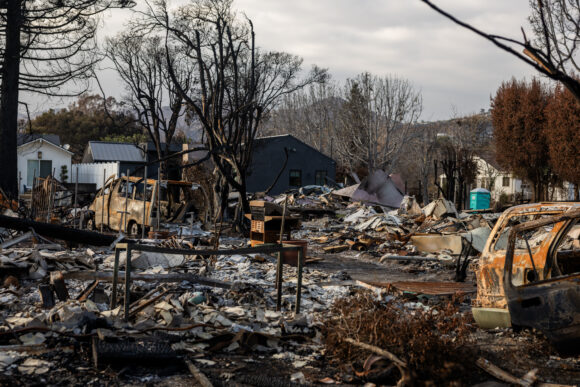The US saw more than $101 billion in losses from severe storms and fires in the first half of 2025, setting a record.
That’s according to a database of billion-dollar disasters that a nonprofit has re-launched since the Trump administration formally abandoned work on it in May.
In a new analysis published Wednesday, scientists tallied damage from severe weather events through June, which has become the costliest such period in 45 years of records. The analysis, which the National Oceanic and Atmospheric Administration ran for more than a decade, has been picked up by the nonprofit Climate Central.
“The rise in damages relates to human activity,” said Adam Smith, the former NOAA scientist now managing the disaster database for the group. “Whether it’s the amplification of climate change on extreme weather or how we’re choosing to build, it causes exposure and vulnerability.”
Related: Natural Disaster Claims in 2025 to Again Top $100B Despite ‘Abnormally Low’ Q3 Events
Much of the damage in 2025 stems from devastating fires in Los Angeles. Spring tornado outbreaks and severe thunderstorms in the central and southern US account for more than $40 billion in losses, Smith said, adding that the analysis is based on the same underlying data and methods used at NOAA.
NOAA, which also oversees the National Weather Service, has lost hundreds of staff to firings, voluntary exit programs pushed by the Trump administration and attrition since January. In a statement, NOAA communications director Kim Doster said the agency was refocusing its resources away from the billion-dollar disaster projectand “prioritizing sound, unbiased research over projects based in uncertainty and speculation.”
The record losses come at a time when there are fewer funds available to help devastated areas. The Federal Emergency Management Agency was set to run out of money in its Disaster Relief Fund by the end of September, according to a report to Congress filed this summer. But as FEMA waded through court battles related to its allocation of resources, the agency had managed to avoid draining its accounts heading into this fall.
FEMA is also authorized to continue providing relief during the federal government shutdown. More than a dozen aid requests and appeals were awaiting President Donald Trump’s approval as of this week, with some states reporting long waits for assistance. FEMA did not respond to a request for comment.
The US has avoided a direct hurricane hit in 2025, though forecasters are closely tracking Tropical Storm Melissa, which is expected to strengthen as it travels across warm waters in the Caribbean in the coming days.
Photo: Homes destroyed by the Palisades Fire. Photographer: Roger Kisby/Bloomberg
Topics USA Profit Loss
Was this article valuable?
Here are more articles you may enjoy.



 Florida Regulators Crack the Whip on Auto Warranty Firm, Fake Certificates of Insurance
Florida Regulators Crack the Whip on Auto Warranty Firm, Fake Certificates of Insurance  Zurich Insurance Profit Beats Estimates as CEO Eyes Beazley
Zurich Insurance Profit Beats Estimates as CEO Eyes Beazley  Lemonade Books Q4 Net Loss of $21.7M as Customer Count Grows
Lemonade Books Q4 Net Loss of $21.7M as Customer Count Grows  US Supreme Court Rejects Trump’s Global Tariffs
US Supreme Court Rejects Trump’s Global Tariffs 

